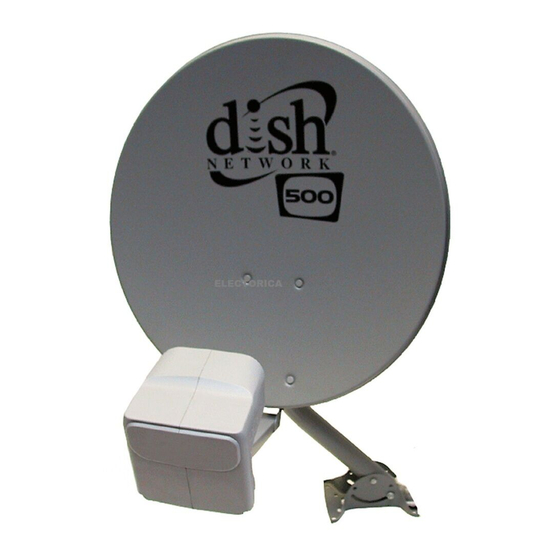Dish Network DISH 1000 Handleiding voor installatie-instructies - Pagina 5
Blader online of download pdf Handleiding voor installatie-instructies voor {categorie_naam} Dish Network DISH 1000. Dish Network DISH 1000 16 pagina's.
Ook voor Dish Network DISH 1000: Handmatig (18 pagina's), Handmatig (20 pagina's)

Locating the Dish Antenna
Use the Angles Tables starting on page 8 to find the azimuth, elevation, and skew angles using the ZIP code
from your location. Write the angles in the space provided below.
:
Azimuth
Using these azimuth and elevation angles, find a mounting location for the satellite dish, which can be
pointed towards the satellites located at these angles. Use a compass and the azimuth angle to find the
direction along the horizon that the dish should be pointed. Then use the elevation angle to find out how
high the satellites are in the sky from your location. Make sure nothing blocks the line of sight between the
dish and the satellites. Make sure this line of sight will not be blocked by future growth of nearby trees or
other foliage. Also make sure your mounting location provides sufficient clearance to rotate the reflector as
needed to point toward the satellites.
Assembling and Mounting the Dish
Follow these instructions to assemble the satellite dish, mount it, and point it in the direction of the
satellites.
Using the azimuth and elevation angles, find a location for the satellite dish which can be pointed
towards the satellites located at these angles. Make sure nothing blocks the line of sight between the
dish and the satellites.
Mount the mast to a solid surface so that the dish antenna cannot move or be bumped out of
adjustment. Keep in mind that physical and environmental conditions can block your satellite dish's
ability to receive a clear satellite signal. Never mount to a tree or a public utility pole.
Align the top part of the mast so that it is absolutely vertical. If the top part of the mast is off vertical
by only a few degrees, it will be difficult or maybe even impossible for you to find the satellites. Take
at least two readings with a level, on the upper mast, that are 90 degrees apart from one another (see
Figure 1).
Assemble the satellite dish as shown in Figure 1, except do not attach the LNBFs at this time.
Loosen both skew bolts and set the skew by rotating the dish mounting bracket to align the red mark
with the required angle on the skew scale which you wrote down above. Tighten the skew bolts
securely to keep the dish from rotating. See Table 1 for the required torque values. After the skew is
set, do not try to fine-tune the skew angle when aiming the dish.
Set the elevation by tilting the dish mounting bracket to align the red edge with the required angle on
the elevation scale. Tighten the elevation bolts snugly to prevent movement.
Slide the dish assembly down onto the mast. Make sure the pivot bolt rests on the top of the mast.
Turn the dish assembly so that it points in the general direction of the satellites, using the azimuth
angle you wrote above.
:
Elevation
:
Skew
Page 3
